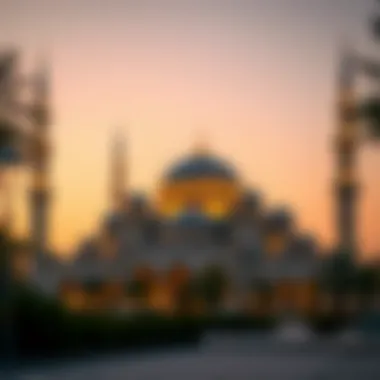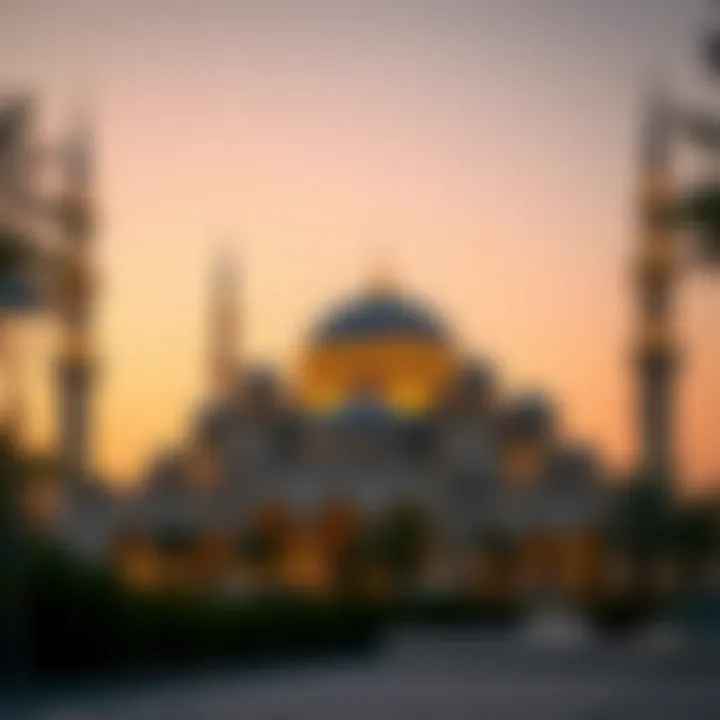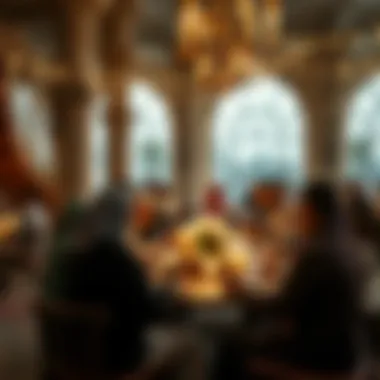Understanding Fasting Hours in the UAE: A Comprehensive Guide


Intro
Understanding the nuances of fasting hours in the United Arab Emirates, especially during Ramadan, is essential for anyone living in or visiting this culturally rich region. Fasting, known as sawm in Arabic, is not merely an abstention from food and drink; it is a profound expression of faith and community. This practice is steeped in tradition and offers insights into the local customs that shape everyday life.
In the UAE, Ramadan is a period marked by devotion, social gatherings, and the shared experience of fasting, which begins at dawn and ends at sunset. The exact hours for fasting can differ slightly based on geographical location and the time of year, as they are aligned with the daily prayer schedule.
This article aims to dissect the complexities surrounding fasting hours, delving into the historical context and legal perspectives. Furthermore, it addresses how these practices affect both residents and tourists, especially concerning health, social behaviors, and compliance with local customs. By the end, readers should have a well-rounded understanding of the integration of fasting into UAE life and feel equipped to interact respectfully with the local culture during these sacred hours.
"Fasting teaches self-discipline, self-control, and empathy for those less fortunate."
For both expatriates and long-term residents, recognizing these fasting hours is not just about adjusting meal times, but also about embracing the cultural significance behind this practice. As we explore the depths of fasting in the UAE, let’s uncover the historical intricacies and contemporary implications together.
Prologue to Fasting in the UAE
Fasting is a practice deeply embedded in the cultural fabric of the UAE, particularly observed during the holy month of Ramadan. This introduction aims to shed light on why understanding fasting in this region is not just a matter of religious observance but a shared experience that resonates across various aspects of life. Modified from longstanding traditions, fasting hours reflect a rich tapestry of beliefs, social customs, and even legislation, making it a vital topic for both residents and visitors alike.
Fasting is not solely about abstaining from food and drink; it is woven through community bonds, spiritual growth, and a profound sense of discipline. The practices during this time, particularly in the UAE, can differ quite a bit from those seen in other Muslim-majority countries. Each Emirate has its unique take on how the fast is observed, which brings us to the important factors we must consider:
- Cultural Diversity: The UAE is home to a melting pot of cultures. Expat communities contribute to the richness of the practices by introducing their own customs.
- Significance of Timings: The hours of fasting, beginning at dawn and ending at sunset, dictate daily routines, influencing work, school schedules, and social gatherings.
- Health Considerations: While fasting has numerous spiritual benefits, it’s essential to consider the physiological impact. Understanding what nutrients should be consumed during Suhoor and Iftar is crucial, especially for those adjusting to different dietary habits.
By delving into these layers, we can appreciate how fasting hours play a fundamental role, shaping not only individual behavior but societal norms as well. This guide provides a comprehensive overview, ensuring that both locals and visitors grasp the significance of the fasting hours and the cultural landscape they navigate during Ramadan.
Cultural Significance
Fasting during Ramadan goes beyond the individual; it creates a communal spirit that binds people together. Families gather to break their fasts, and neighborhoods come alive with the sounds of prayer and shared meals. The cultural significance is illustrated vividly through the audible calls of the adhan, or prayer call, which signify the time for Iftar. These moments act as a daily reminder of unity, reflecting the collective nature of the observance.
Moreover, traditions like charity and community feasts flourish during Ramadan, enhancing social bonds. This time of fasting is as much about giving as it is about self-restraint. The act of feeding those in need becomes paramount, further enriching the cultural narrative that underscores compassion and generosity.
Religious Background
Fasting in the UAE finds its roots in Islamic teachings, particularly derived from the Qur'an, which outlines the importance of self-discipline through abstaining from food and drink. Observed in the ninth month of the Islamic lunar calendar, Ramadan serves as a time for spiritual reflection, heightened devotion, and worship. The teachings of the Prophet Muhammad also emphasize fasting as a form of social justice, aligning with the belief that experiencing hunger leads to a greater empathy towards the less fortunate.
The duration of fasting is specifically from Fajr, the dawn prayer, until Maghrib, the evening prayer at sunset. This period demands that participants engage in mindful living, filling their souls with gratitude while purging themselves of earthly distractions. Moreover, the significance of these fasts extends further into the practices associated with community, reflection, and the pursuit of peace. Yet as one reflects on the profound implications of fasting, it becomes evident that these religious tenets intertwine seamlessly with the cultural and social dynamics of the emirati lifestyle.
Duration of Fasting Hours
Understanding the duration of fasting hours in the UAE is crucial for both residents and visitors alike during the holy month of Ramadan. This section sheds light on the specific hours designated for fasting, the routine these hours create, and how this timeframe significantly influences various aspects of daily life in the UAE.
Fasting Length During Ramadan
The fasting period in Ramadan extends from the early hours of dawn until sunset. This typically ranges from 13 to 15 hours each day, depending on the time of year and geographical location within the UAE. The length of the fast can change as Ramadan moves through the lunar calendar, requiring practitioners to adjust their schedules accordingly.
Engaging with fasting during this period is both a test of physical endurance and a spiritual journey. It’s essential for individuals to prepare adequately, as the length of fasting can lead to dehydration and fatigue if not approached mindfully. Therefore, the practice isn't just about abstaining from food and drink but also about embracing patience and reflection.
Daily Schedule Overview
The daily timetable for fasting is sharply defined from the pre-dawn meal, known as Suhoor, until the Iftar, the meal that breaks the fast at sunset. This schedule is pivotal as it not only dictates eating habits but also impacts daily activities and social interactions.
Suhoor Timing
Suhoor is the pre-dawn meal that serves as vital preparation for fasting. It typically occurs about 30 minutes before Fajr, the dawn prayer. Many consider this meal immensely significant because it helps sustain energy levels throughout the day. Suhoor should ideally emphasize hydration and nutritional balance, incorporating foods that release energy slowly such as oats, whole grains, and fruits.
The essence of Suhoor lies in its timing and content, providing not just a meal but a moment for spiritual reflection before the day of fasting begins.


Iftar Timing
Iftar, the meal consumed at sunset to break the fast, is a moment of celebration and community. The timing for Iftar is based on the Maghrib prayer, and this ritual typically starts as the sun sets. While traditionally, dates and water are consumed first, followed by a spread of local dishes, the Iftar meal varies widely from one household to another.
The joy of coming together with family and friends during Iftar is a key aspect of Ramadan, fostering a sense of belonging and togetherness.
Variations by Emirate
Fasting practices and timings can fluctuate across the different emirates in the UAE. For instance, in a cosmopolitan hub like Dubai, the range of dining options that cater to pre-dawn and Iftar meals can be abundant and diverse, reflecting the international populace. In contrast, in more traditional emirates like Ajman, one might encounter a simpler setting focused largely on local foods and customs. These variations highlight each emirate’s unique identity while still adhering to the core religious tenets of Ramadan.
This regional diversity adds richness to the fasting experience, allowing both locals and visitors to immerse themselves in the local customs.
Being mindful of these fasting durations and practices ensures a respectful approach to Ramadan's spiritual significance, enriching both personal experiences and communal bonds.
Regional Variations in Fasting Practices
Fasting during Ramadan is not just a personal commitment, but also a reflection of the diverse cultural fabric of the UAE. Each emirate has its own unique approach and local customs that shape the fasting experience. The significance of understanding these regional variations lies not only in respect for the local traditions but also in navigating social interactions, especially for expatriates and visitors. This section delves into how different emirates approach fasting, shedding light on the practices that set them apart.
Differences Across Emirates
Dubai
Dubai is often seen as the melting pot of cultures, with its large expatriate community influencing many aspects of life, including how fasting is observed. One notable characteristic of Dubai during Ramadan is the availability and variety of Iftar options. The emirate boasts a plethora of hotels and restaurants offering lavish Iftar buffets that cater to both locals and visitors alike. This not only enriches the dining experience but also promotes social gatherings, reflecting the cosmopolitan nature of the city.
The unique feature is the impressive array of culinary traditions celebrated during Iftar. From Middle Eastern delicacies to international cuisines, Dubai becomes a culinary hub. However, while such offerings enhance the experience, they can also lead to a perception that fasting is merely a festival of food, which might not align with the spiritual intent of the month.
Abu Dhabi
Abu Dhabi, the capital, takes its traditions quite seriously. The key characteristic here is the emphasis on community and family. Iftar gatherings in Abu Dhabi are often intimate affairs, where families come together to break their fast. This practice nurtures bonding and reinforces cultural ties within the community.
A distinctive aspect is the public Iftar tents set up across the emirate, providing meals to those in need. This demonstrates the core values of charity and generosity central to Ramadan. Though, one downside might be the limited variety compared to Dubai, as the focus tends to veer more toward community-focused traditions rather than expansive culinary options.
Sharjah
Sharjah stands out for its strict adherence to Islamic customs and traditions. Here, fasting is observed with a deep sense of spirituality and less commercialism. The emirate’s residents often emphasize prayer and reflection over elaborate food preparations. This focus on spirituality fosters a serene atmosphere during Ramadan.
The unique feature in Sharjah is the number of cultural events and lectures held throughout the month. These events encourage educational pursuits, so while the culinary experience may be subdued, the intellectual engagement provides a different form of enrichment. However, visitors might find fewer options for dining out during the day, as many establishments respect the local customs of fasting.
Ajman
Ajman, the smallest emirate, still holds its own traditions that are rich in warmth and community spirit. Iftar in Ajman often features family-driven events where residents gather in community squares or parks. The local markets and shops engage in vibrant nighttime activities post-Iftar, creating a lively atmosphere.
One notable characteristic of Ajman is its emphasis on local dishes, which brings a sense of comfort and familiarity among its residents and the expatriate community. Although Ajman doesn't have the sprawling commercial setups seen in larger emirates, its cozy gatherings and local food stalls embody the communal nature that is treasured during Ramadan.
Influence of Expat Communities
The diverse expatriate communities in the UAE significantly impact local fasting practices and cultural adaptations during Ramadan. Many expatriates introduce their own customs while respecting the core Islamic principles, resulting in a unique blend of celebrations. The coexistence of various traditions provides a richer tapestry of experiences, where local and global practices harmonize.
Understanding and acknowledging these variations not only fosters a spirit of inclusivity but also enhances the ability to engage with the local culture respectfully. \n > "Diversity is the one thing we all have in common. Celebrate it every day." -- Author Unknown
Such awareness helps expatriates and visitors navigate social interactions during the holy month, ultimately contributing to a more cohesive community.
Legal Framework Governing Fasting


The legal framework governing fasting in the UAE is a critical aspect that shapes the experience of Ramadan for residents and visitors alike. Understanding these laws helps one navigate the delicate balance between cultural respect and individual freedom. Here, we delve into the specifics, examining how regulations influence fasting practices and the wider implications for everyone in the region.
Enforcement of Fasting Rules
Fasting during Ramadan is not merely a religious obligation; it has legal ramifications as well. The UAE's laws strictly enforce the prohibition of eating, drinking, or smoking in public places during fasting hours. This comes with hefty fines for those who do not comply. For instance, there have been instances of fines reaching up to 2,000 AED for public violations. Such enforcement ensures that the sanctity of the holy month is respected.
Authorities may increase patrols and monitoring in public spaces to encourage compliance. Additionally, businesses, especially those in the hospitality sector, are expected to adhere to these rules, which often includes closing during the day or providing special services for non-fasting patrons post-Iftar. To many, this might seem stringent, but for Emiratis and devout Muslims, it's a way to uphold their values and traditions.
“The essence of Ramadan lies not just in fasting; it’s about community, self-restraint, and spirituality.”
However, while there are strict regulations, it’s also essential for visitors to be aware of how these laws apply to them, allowing for a respectful approach to their experiences in the UAE.
Rights of Non-Fasters
While fasting is a central theme during Ramadan, it's vital to recognize that there are many who do not partake in the fast, including expatriates and tourists. The laws in the UAE also accommodate these individuals, although there are specific guidelines they must follow.
- Designated Areas for Eating: Non-fasters are permitted to eat and drink in designated areas. Many hotels, restaurants, and private clubs remain open during fasting hours to cater to the needs of non-fasters. However, it’s crucial to be discreet and respectful, as loud eating and drinking in public can offend those observing the fast.
- Understanding Social Norms: Non-fasters should be aware of the local practices during Ramadan. This means avoiding public displays of eating or drinking outside of designated zones. Grasping the cultural subtleties can enrich one’s experience while navigating daily life in the UAE during this transformative month.
- Legal Protections: The rights of non-fasters are recognized by the law, with provisions in place to ensure that they can comfortably go about their daily activities. This creates a unique environment that respects individual choices while upholding the collective spirit of Ramadan.
In essence, understanding the legal framework of fasting hours in the UAE not only fosters respect for local traditions but also guides non-fasters in navigating their own experiences during this significant time. This delicate interplay of laws, respect, and personal choices sets the stage for a harmonious blend of cultural practices that shape the UAE's identity.
Health Considerations During Fasting
Fasting during Ramadan brings about several health considerations that should not be overlooked. The month-long observance can greatly affect one's physical and mental wellbeing, especially when considering the drastic changes to eating patterns and daily routines. Understanding these factors is crucial for both fasters and those who support them to navigate through this period while maintaining good health.
Nutritional Guidance
Essential Foods for Suhoor
Suhoor, the pre-dawn meal, is vital for sustaining energy levels throughout the long fasting hours. The right combination of foods can set the tone for a productive day. Foods rich in complex carbohydrates, such as whole grains like oats or brown rice, provide a slow release of energy, while protein sources like eggs, yogurt, or legumes contribute to longer satiety. Healthy fats, such as avocados or nuts, offer additional energy and help in the absorption of fat-soluble vitamins.
A key characteristic of these foods is their ability to stabilize blood sugar levels, reducing the risk of fatigue and irritability that can come from fasting. Moreover, consuming foods high in water content, like fruits and vegetables, is a popular choice among those who are fasting. This helps prevent dehydration and supports hydration during the day. However, it’s essential to avoid overly salty or sugary foods, as they can lead to thirst and spikes in energy that crash quickly.
Recommended Iftar Meals
As the sun sets, Iftar marks the moment to break the fast. The meal often begins with dates and water, following a practice rooted in tradition and health benefits. Dates are an excellent source of natural sugars, fiber, and essential minerals, making them an ideal choice to restore energy quickly.
For the main meal, a balance of carbohydrates, proteins, and vegetables is recommended. Dishes such as lentil soup, grilled meats, and a variety of salads are common during Iftar. A defining feature of Iftar meals is their communal nature, often shared with family and friends, fostering a sense of togetherness during the holy month. It’s also essential to control portion sizes to avoid discomfort, given the long fasting hours preceding this meal.
"Breaking the fast with a thoughtful meal can greatly contribute to overall well-being during Ramadan."
Health Risks and Precautions
Not everyone may cope well with fasting, especially those with pre-existing health conditions like diabetes, heart disease, or pregnant women. It’s significant to approach fasting with caution, ensuring regular consultations with healthcare providers. Staying hydrated during non-fasting hours, monitoring energy levels, and ensuring adequate nutrition are essential measures to minimize health risks.
Potential challenges also include headaches, fatigue, and digestive issues if expectations are not managed correctly. Balance is key – listening to one’s body and knowing when to adjust fasting goals can make all the difference. Also, one shouldn’t forget to seek help or medical advice when in doubt or facing health difficulties during Ramadan. Those who are able to manage these considerations will often find a rewarding and fulfilling experience throughout the holy month.
Social Customs During Ramadan
During the month of Ramadan, the UAE transforms into a realm rich with customs and practices that embody the spirit of the holy month. These social customs are crucial as they serve not only to strengthen community bonds but also to cultivate an atmosphere of respect and understanding, fostering a deeper connection with tradition among both locals and expatriates. Understanding these practices is essential for anyone looking to engage meaningfully during this spiritual time.
Traditional Practices
Charity and Almsgiving


One of the cornerstone practices during Ramadan is charity and almsgiving, or Zakat, which holds great significance among Muslims worldwide. The act of giving to those in need is not just a religious obligation, it is also a social glue that binds communities together. During this month, many individuals become particularly generous, reflecting the values of compassion and empathy. The unique feature of Ramadan is that acts of charity are often amplified; it’s common for people to donate not just money but also food and essential items.
The benefits of engaging in charity during Ramadan extend beyond the act itself. It fosters a sense of belonging and community spirit, which is crucial in a diverse society like that of the UAE. Each contribution, no matter the size, plays a role in creating an environment that can lift those who are less fortunate. However, given the high demand for charitable contributions, it is important for donors to choose reputable organizations and ensure that their contributions reach those who truly need them. This diligence helps in maximizing the positive impact of their generosity, a key aspect often overlooked in the fervor of giving.
Community Gatherings
Another vital part of Ramadan is community gatherings, where families and friends come together to break their fast at iftar. These gatherings are not merely about sharing a meal; they represent a time of togetherness, reflection, and reconnection with loved ones. The key characteristic of these gatherings is their inclusive nature. Whether it’s a lavish meal or a simple date and water, the emphasis is on unity and shared faith.
These communal meals can take various forms, from large gatherings in homes to meals organized by mosques or community centers. A unique aspect of these gatherings in the UAE is the cultural blending that occurs; with a multitude of nationalities residing in the country, you may find a wide array of dishes that reflect global gastronomy. This aspect not only highlights culinary diversity but also connects different communities over shared experiences.
However, planning these gatherings needs consideration. Logistics, such as timing and dietary restrictions, play a significant role in ensuring that everyone feels comfortable and included. In a nutshell, these practices enrich the community tapestry, facilitating relationships that transcend religious and cultural boundaries.
Hospitality During Fasting
The nature of hospitality during fasting hours deserves special mention. In the UAE, offering food and drink to guests is customary, even for those observing the fast. This highlights a key cultural value—hospitality is deeply embedded in Emirati traditions. During Ramadan, many restaurants and hotels adapt their schedules, providing private dining rooms for non-fasters and organizing special iftar buffets, celebrating the essence of sharing abundance.
However, visitors should be aware of certain etiquette in this arena; eating and drinking in public during fasting hours is generally frowned upon. Non-Muslims are encouraged to be respectful of this practice to foster a harmonious atmosphere. This dynamic creates a unique blend of respect and cultural learning for expatriates and tourists, allowing them to experience firsthand the warmth of Emirati hospitality while adhering to local customs.
"In the act of giving and gathering, we find the true essence of our community. In Ramadan, it is not just food or charity we share, but our very selves."
This rich tapestry of social customs during Ramadan provides a framework for understanding the month’s significance beyond just fasting. It emphasizes community, compassion, and cultural exchange, all of which are essential for anyone looking to engage respectfully within the UAE.
Implications for Tourists and Visitors
Fasting in the UAE, particularly during Ramadan, extends beyond mere abstinence from food and drink; it encapsulates a multifaceted experience that can significantly affect the way tourists and visitors engage with the local culture. For those planning to visit, understanding the nuances of fasting hours is not just about etiquette but also about enhancing one's experience in the country.
Etiquette for Non-Muslims
When visiting the UAE during Ramadan, non-Muslims are encouraged to respect the fasting customs observed by the local Muslim population. This observance promotes harmony between cultures and showcases a mutual understanding among diverse communities.
Some key points to consider include:
- Eating and Drinking: It is generally frowned upon to eat, drink, or smoke in public during fasting hours. This includes not only avoiding meals but also refraining from visible consumption, such as drinking water on the street. A discreet approach is more respectful and appreciated.
- Dress Code: Modest clothing is always a good idea in the UAE, but during Ramadan, it becomes even more important. Covering shoulders and knees is advisable to show respect for the cultural practices.
- Greetings: Instead of exchanging typical greetings, acknowledging the occasion of Ramadan can foster goodwill. Common phrases often include "Ramadan Kareem" as a way to wish someone a blessed month.
- Events and Activities: Many events, exhibitions, and cultural experiences may be available during Ramadan. It’s a perfect time for tourists to engage with local customs, whether through attending iftar dinners or visiting markets. However, be mindful of fasting hours.
Dining Options During Fasting Hours
As tourists navigate the UAE’s culinary landscape during Ramadan, it's critical to be aware of dining options that align with local customs while satisfying your culinary cravings.
- Iftar Buffets: Many restaurants offer lavish iftar buffets that commence once the sun sets. These buffets provide a chance to indulge in local and international dishes. Establishments like Al Hadheerah in the Bab Al Shams Desert Resort not only provide traditional Arabian cuisine but also introduce visitors to cultural entertainment.
- Takeaway and Home Delivery: Some restaurants continue to operate and even provide takeaway options. However, diners should confirm whether these services are available during the fasting hours.
- Cafes and Hotels: Many hotels and cafes cater specifically to tourists and may allow dining during the day. While these venues ensure privacy for their guests, it’s always best to check with staff regarding policies, especially if dining in common areas.
- Special Menus: With varying levels of discretion across the emirates, some establishments may prepare special menus highlighting Suhoor (pre-dawn meal) offerings, but only after sunset.
Understanding these dining options ensures pleasant visits without unexpected cultural missteps. It also allows tourists to partake in the culinary richness that the region offers at a time when local flavors are especially vibrant.
Remember: Respecting local customs during Ramadan enhances your travel experience while fostering connections with residents. It’s an opportunity to learn and appreciate a significant aspect of Emirati culture.
End and Reflections
The nuances of fasting in the UAE, particularly during Ramadan, provide a lens through which one can appreciate the intricate tapestry of Emirati culture. The importance of fasting extends well beyond mere abstention from food and drink. In this article, we have delved into the historical roots, the deeply ingrained customs, and the legalities that shape the experience of fasting, not just for Muslims but for everyone residing in or visiting this vibrant country.
Understanding Fasting in Modern Context
Today, fasting in the UAE carries both traditional significance and modern implications. As the nation modernizes while preserving its heritage, the practice of fasting reflects this duality. Many young Emiratis are finding ways to blend their lifestyles with time-honored customs, creating a setting where tradition meets contemporary life. Online platforms and social media have transformed how people share their experiences during Ramadan, knitting a tighter community both locally and globally. This interaction fosters a deeper understanding among various cultures and promotes respect for diverse practices.
In today’s world, one can witness various adaptations of fasting traditions. For instance, technology helps to compute prayer and fasting times precisely, while apps provide recipes and meal plans that cater to health-conscious individuals observing the fast. Even businesses have adapted by creating Iftar dining experiences that reflect local flavors while introducing international tastes, emphasizing inclusivity.
Future Trends in Fasting Practices
As we gaze into the future, several noteworthy trends in fasting practices are already emerging. Firstly, increased globalization and the influence of expatriate communities is reshaping traditional observances. Foreign residents often bring their customs during Ramadan, resulting in a melting pot of practices that can enhance the overall experience.
We can expect a greater focus on wellness as more people become aware of health implications associated with fasting. Nutritional trends advocating a balanced intake of essential foods during Suhoor and Iftar are likely to gain traction, with local health authorities potentially promoting specialized dietary guidelines, aiming to ensure everyone—regardless of their cultural background—can observe fasting safely and effectively.
Additionally, as environmental concerns rise, there is a growing dialogue on sustainable practices during Ramadan. From reducing food waste during Iftar gatherings to advocating the use of eco-friendly materials in food packaging, there's a palpable shift towards a more conscientious approach in how fasting is integrated into daily life.
In summation, understanding the practice of fasting in the UAE reveals its profound significance not only within the Muslim community but also within the broader social framework. As we navigate future fasting practices shaped by cultural exchanges and emerging trends, it's clear that the essence of Ramadan will continue to evolve while remaining deeply rooted in respect and understanding.















